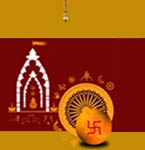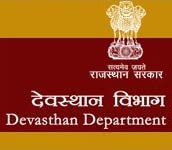 |

|

|
.jpg)
|
 |
|
|
| Visitor's No :
|
| Download Word |
Rajasthan Fund Service Rules, 1959 FIRST PUBLISHED IN THE RAJASTHAN RAJPATRA, The Service Rules Relating to the staff of self supporting (funded) court of wards temples under the control and superintendence of Devasthan Department, Rajasthan. CHAPTER-I
CHAPTER-II
Classes of servants and their duties. 6. Mahant: The spiritual head of temple of the institution and as such he is responsible for the management of the estate in a proper manner and he shall see that the income is utilised only for the purpose of worship of the Thakurji or deity or upkeep of the temple or institution. 7. Adhikari or Manager or Kamdar: -Is a paid servant of the temple fund or institution. He shall be responsible for thegeneral management of the Temple or institutions, keeping proper accounts and the safe custody of ornaments and valuables of the temples entrusted to his care. He will also be responsible for the proper control of the movable and immovable property of the temple or the institutions. 8. Clerk or Karinda or Nigran : He is merely a clerk who will do the work assigned to him by the Manager, Adhikari or Kamdar. He shall be generally responsible for collection of rent keeping proper account of income and expenditure and of the movable and immovable property attached to the temple or institutions. 9. Pujari or Mukhiya- He performs or supervises the Puja of the Thakurji. He has no powers of any sort over any thing. He is responsible for the supply of the ornaments and other valuables entrusted to his care for the daily use of the Thaknrji (Deity) and he will be liable to make good the loss if there be any. He is either a paid servant of the temple or having hereditary rights by turns (Osrawala or Baridar) for performing Sewa Puja of the Thakurji (Diety). 10. Bhandari or Kothari – Is in charge of Bhog Rag articles, Parshad and other articles of stock. 11. Rasoiya, Balbhogiya or Bhitrya (Cook) – Prepares daily Bhog and Prashad for the Thakurji. 12. Jalgariya or Jalsewak – Who supplies water for the temple. He is a water carrier of the temple. 13. Japtiya or Chobdar – Who guides Darshaks and Yatries and Provides facilities to them for Darshan of the Thakurji Properly. 14. Buhariya or Tahlya- A person who cleans utensils and sweeps the temple or institutes daily. 15. Chowkidar or Poliya or Pahrayati- Is a person as its name implies who keeps watch over the temple or institutions and its property. 16. Kirtaniya or Musician – Sings religious songs and plays a Pakhawaj before the Thakurji (Deity) both in the morning and eveinig. 17. Definations: In these Rules -
CHAPTER-III
Conditions of Service 17. Mahant shall be appointed by the Government on the recommendation of either a committee or the Devasthan Department on such pay and allowances or pattal Prashad according to the financial status of the temple or institution and he will be required to possess the following qualifications :
He will be responsible for the safe custody of the temple Ornaments, Jewelries, Funds Property movable and immovable He will make suitable arrangement for the regular worship including Bhog Rag of the Thakurji (Deity) in accordance with the principles of the Sampradaya to which the temple or institution belongs. He will be required to keep regular accounts of all revenue receipts and expenditure according to the instructions issued and procedure laid down by the Government. He will be liable to removal under the following circumstances-
18. Adhikari or Manager or Kamdar : He will be appointed by the Devasthan Department on a salary upto Rs.200/- p.m. and above that by the Government. He will be responsible to the Devasthan Department or to the Committee if there is any for maintaining regular and complete account of income and expenditure of the temple or institution. Besides routine work he will be responsible for the due supervision of Sewa Puja the Kitchen and the general cleanliness of the temple or institution as also for the punctuality of the temple staff and recovery of rent etc. He will be required to submit annual budget of income and expenditure of the temple or institution to the Devasthan Department. He will be responsible for maintaining a record and complete plans of residential and cultivable properties of the temple or institution. He will responsible for such damages or loss to the temples property or its income as may have been occurred by his negligence or willful default. *Clerk or Nigran : He will be appointed by the Devasthan Department on such pay and allowances according to the financial status or condition of the temple or institution on the recommendation of the Committee or the Assistant Commissioner Devasthan. He will be responsible for the maintenance of correct and accurate account of income and expenditure of the temple or institution according to the approved procedure and also for the timely recovery of rent etc. 19. Pujari or Mukhiya – He will be appointed by the Assistant Commissioner, Devasthan on the recommendation of either a committee or the Inspector Devasthan upto Rs. 25/- p.m. He shall be literate and should possess full knowledge of mantras and Sastras of daily worship of the Thakurji. He will be required to produce a certificate of the approved Sanstha regarding his knowledge of Mantras and Sastras of the Samprandaya concerned. He will be required to produce a certificate of good moral character from a Magistrate or any M.P. or M.L.A. or Sarpanch of the District to which he belongs or any Gazetted Officer. He will not be delegated any financial powers. He will be employed on salary or monthly emoluments (Pattal Parshad). He will be allowed to reside free in the temple where accommodation is available. He will be liable to removal on account of misconduct, dishonesty, negligence and disobedience. Conviction by a court of law on account of political and seditious activities against the Government or for any cognisable offence. He should not be less than 25 years of age on the date of appointment. He will not be eligible for any type of Bhets unless authorised by the Devasthan Department. Hereditary or Osrawala pujari will not be entitled to any pay and allowance unless authorised by the government and will be eligible for full or certain proportion of cash Bhet as authorised by the Government from time to time. He will have no proprietary rights over the temple property. 20. The rest of the staff noted in rules No. 11 to 17 will be appointed by the Assistant, Commissioner, Devasthan or by the committee if authorised, according to the suitability. 21. All the members of the staff will be required to produce medical certificate of a recognised doctor or vaidya for physical fitness at the time of first appointment. 22. The permanent staff of the temple or institution will not accept any whole time job without the permission of the Devasthan Department. 23. Securities – The Manager, Adhikari, Kamdar Clerk or Karinda and the Pujari or Mukhiya shall be required to furnish adequate securities in cash or property or personal as may be fixed by the Devasthan Department according to the value of the property, ornaments and other store articles in their possession and custody and the amount of cash handled by each of them. 24. Superannuation Age – (a) The Mahant, Adhikari and Clerk will normally be retired after attaining the superannuation age of 55 years and the rest after attaining the age of 60 years but may be allowed to continue in service upto the age of 60 and 65 years respectively at the discretion of the appointing authority provided yearly certified they are medically. Physically and mentally fit. In no case the staff shall be allowed to remain in service beyond the age of 65 years. (c) The Devasthan Department shall have the right to retire any member of the staff after completion of 30 years' service on account of the inefficiency mental or physical disability or negligence. Pay and Allowance : The pay and allowance of the staff will be fixed according to the nature of duties and the capability and suitability of the individual which will be judged by the Devasthan Department. CHAPTER – IV 25. Retiring Benefits : (a) The staff shall be subscrible to a provident Fund. (b) Every permanent member of the staff after the date of the commencement of these rules shall be required to subscribe to the P.F. of the temple or institution under which he is employed at the rate of six and one quarter percent of his basic salary in accordance with the rules made there under. The temple or institution shall contribute to the P.F. of each subscriber an amount equal to the amount of his subscription. (c) The retired Government servant who are re-employed will not be eligible to contribute to the Provident Fund. CHAPTER – V 26. It is a fundamental principle that the T.A. is a compensatory allowance and is so regulated that it is not on the whole a source of profit to the recipient but the officer travelling on temple service will not be out of pocket. 27. Traveling allowance consists of :
28. For the purpose of travelling allowance the temple staff are divided into the following classes : Pay for the purpose of calculation of T.A. and D.A. in respect of temple staff will be the basic pay excluding D.A. 29. No. member of the staff is entitled to any T.A. for journery on halts within five miles of his head quarters. 30. Travelling all allowance will be admissible according to the following scale - Rail Mileage Daily Allowance
*** Amended vide Govt. Order No. F.10(39) Rev/A/57 dt. 14.10.1960. 31. A member of the staff who while making a journey by road, takes a single seat in any public conveyance which plies regularly for hire between fixed points at fixed rates of charge shall be entitled to a mileage allowance at the rate of one anna per mile. 32. For the purpose of calculating mileage allowance, a journey between the places is held to have been performed by the shortest of the two or more practicable routes or by cheapest of such routes as may be equally short. Note : The shortest route is that by which the traveler can most speedily reach his destination by the ordinary modes of travelling. 33. The Chairman and members of the Committee will be entitled to T.A. according to their status judged and decided by the Government.
CHAPTER – VI 34. The following kinds of leave are recognised under these rules -
35. Earning of Leave – (a) The privilege leave shall be earned by the whole time ministerial staff (Manager, Adhikari, kamdar, Karinda or nigran ) at the rate of one eleventh part of the time during which the member of the staff has been on duty without interruption. 36. Conditions : 37. Casual Leave :
38. Sanctioning authority: - all leave shall be sanctioned by the Assistant Commissioner, Devasthan concerned who shall maintain the leave account of the staff. In case of emergency and urgency the Inspector, Devasthan shall allow the member of the staff to proceed on leave subject to sanction by the Assistant Commissioner. 39. Interruption- The duty of the staff shall be treated as interrupted-
By order of the Governor, APPENDIX The governor has been pleased to make the following amendments to the service rules relating to the staff of self supporting (funds) court of wards Temples under the control and superintendence of Devasthan Department, Rajasthan.
Daily allowance For ordinary Localities For expensive localities Delhi, Simla, Madras, Srinagar, Mt. Abu, Bombay and Culcutta IVth Class Rs. 2.00 Rs. 2.00
Sd/- APPENDIX ORDER The governor has been pleased to make the following amendment in the service rules relating to the staff of self supporting (funds) court of wards Temples under the control and superintendence of Devasthan Department, Rajasthan. In Rule 30 of the said Rules following may be substituted in the column Daily allowance: – Daily allowance Ist class Rs. 7/- Per day. By order राजस्थान सरकार क्रमांक :- प. 4(14) देव/92 जयपुर, दिनांक :- 5.2.93 विषय :- निधि सेवा नियमों मे संशोधन बाबत । महोदय, उपरोक्त विषयान्तर्गत निर्देशानुसार लेख है कि देवस्थान विभाग में कार्यरत निधि/आत्म निर्भर मंदिर कर्मचारियो के राजकीय यात्रा के दौरान विश्राम भत्ते की नवीन दरें निम्नानुसार दिये जाने की प्रशासनिक एवं वित्तीय स्वीकृति प्रदान की जाती है ।
उक्त आदेश तुरन्त प्रभाव से लागू माना जावेगा । भवदीय (निधि सेवा नियम, 1959 के नियम 30 का संशोधन) |
|